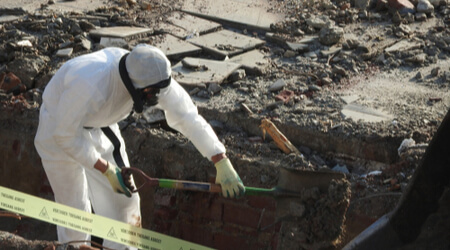
Asbestos was used in many industries and occupations in the past due to its fire-retardant properties.
Unfortunately, most asbestos workers were never given masks, respirators or protective clothing to prevent asbestos inhalation.
Mesothelioma injury lawsuits allege that asbestos manufacturers, suppliers and distributors likely knew that asbestos could cause mesothelioma, but failed to warn the companies that used it, the employees that worked with it and others who were exposed to it on a regular basis.
If you or a family member is suffering from mesothelioma caused by an asbestos product, our injury lawyers in Charleston, Myrtle Beach and Clinton are here to help. Call Joye Law Firm at (888) 324-3100 or fill out a free online consultation form.
Industries Most at Risk for Mesothelioma
Shipbuilding and repair and the automobile industry were the most common industries to use asbestos. However, anyone who worked with asbestos, including construction workers, insulators, pipe fitters, power plant workers and many others, may have been continually exposed to asbestos fibers.
- Shipbuilding & Repair. Workers in shipbuilding and repairing industries used asbestos on a regular basis to insulate pipes, boiler rooms, walls, ceilings and floors – and they often worked in very tight spaces with little or no ventilation. Although asbestos use in shipyards was likely the highest during World War II, the Korean War and the Vietnam War, anyone who worked in the shipping industry is at a greater risk of mesothelioma. In fact, shipyard workers continue to be one of the largest populations to suffer from the disease.
- Automotive Industry. Asbestos was frequently used in the automotive industry in parts such as brake linings, clutch facings, transmission components, disc brake pads, drum brake linings, brake blocks, gaskets and other parts because it could withstand very high degrees of heat. Clutch and brake maintenance is particularly hazardous as servicing requires them to be ground down in order to rejuvenate the linings. Regardless of the jobs performed, workers were at a greater risk of inhaling asbestos fibers as auto making and repair shops were generally not well ventilated.
- Insulator Jobs. Anyone who worked as an insulator is also at a greater risk of developing mesothelioma. Pipe fitters working in steel mills, power plants, oil refineries, chemical plants, and other industrial plants used asbestos to insulate pipes on a daily basis. Ironically, insulators who were required to wear protective gear were often provided with clothing made out of asbestos itself.
Construction workers were exposed to asbestos fibers when insulating homes and office buildings as well as when using products that contained asbestos, such as tiles, flooring and ceiling components. In fact, anyone living or working in an older building may still be exposed to asbestos today.
Occupations Most at Risk for Mesothelioma
South Carolina workers in many occupations may have been exposed to asbestos – some without ever knowing it. Here are just a few of the occupations where asbestos exposure may have occurred:
- Aeronautical engineers
- Aircraft mechanics
- Auto mechanics
- Blacksmiths
- Boilermakers
- Building maintenance’
- Bulldozer operators
- Cabinet makers
- Carpenters
- Crane operators
- Demolition and wrecking crews
- Draftsmen
- Drill press operators
- Electrical engineers
- Electricians
- Firefighters
- Foundry workers
- Freight and material handlers
- Furnace operators
- Heavy equipment mechanics
- Home inspectors
- HVAC workers
- Industrial engineers
- Iron workers
- Machinists
- Mechanics
- Masons
- Mechanical engineers
- Millwrights
- Miners
- Mixing operators
- Molders
- Painters
- Plasterers
- Railroad workers
- Road machine operators
- Sheet metal workers
- Steamfitters
- Structural metal craftsmen
- Textile noperators
- Tile setters
- Tool makers
- Welders

































